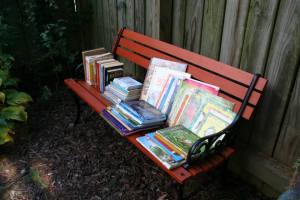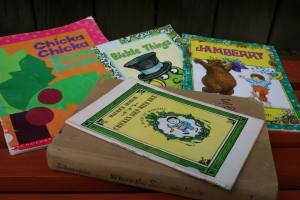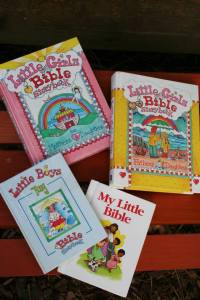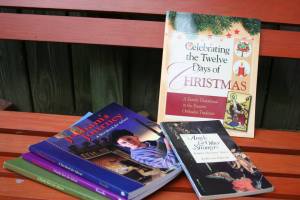This week’s note is an article written by Judy Pappoff, and was originally published in “Faith and Family,” Dec. 2001, p. 18. Its suggestions are still very current and applicable. May God help us to lead our children in godliness in all seasons, especially during the holidays!
What Does Your Family Call December 25th?
The day has been called: “Christmas,” “The Nativity of Our Lord and Savior Jesus Christ,” “The Day Santa Comes,” “Baby Jesus’ Birthday,” “The Day We Give/Get Presents.” As parents, we have the responsibility of “naming” the day for our families. Orthodox Christians celebrate the nativity, or birth, of Jesus Christ.
Most of us also participate in traditions of our society: food, decorations, socializing, presents. What understanding do we want our children to have? Holiday or Holy Day? How do we tame the monster of materialism so that our children focus on the spiritual truth of the feast?
First, let’s examine our purchasing practices. If the family has a video game system that works, does it need to be replaced? We must set the example, and explain our actions. Children will not see what is wasteful unless we bring it to their attention. Then challenge them with “How might the money be better spent?”
Second, keep the focus on giving. Let’s look at why gifts are part of this holy day. It is because God gave us His Son – the greatest gift of all. Then teach your children how to give, and think outside the “box” – even the Grinch realized that Christmas doesn’t come in a box! Spend time as a family, giving homemade gifts to one another, and gifts of love to those in need. Lavishly praise your children for these valuable gifts they give you and others.
Finally, let’s make sure our children know how to receive, with the gift of God’s Son as our example. We accept and are thankful for Jesus Christ. When your children light a candle at the Nativity service, remind them to say “thank you” to God for His Son. Thankfulness is the response to all gifts, large or small. Seasonal movies such as “The Little Drummer Boy” teach this. Know when these will be on. Stop your busy-ness, watch these together, discuss what is good; and in that quiet moment, remember also to say “thank you” to God for the children He has placed in your care.
by Judy Pappoff, Faith and Family (Dec 2001 pg 18), found online at http://www.antiochian.org/christianeducation/whatdoesyourfamilycalldecember25th
Here’s another article in the same vein: http://www.goarch.org/archdiocese/departments/family/articles/giving-receiving
***
Below are links to articles and ideas of ways to help our children combat materialism and consumerism during the holidays.
***
“Lavishing our children with gifts deprives them of something far more valuable: shared time and experiences. In our overscheduled lives, we are often too busy or tired to do a family art project, play a board game or bake cookies. I can’t remember ever roasting chestnuts on an open fire, but it’s always sounded like a lovely idea. Most families say that what they need more of is time – not stuff. And getting in and out of shopping centers steals your time.
Overabundance of holiday gifts offers a short-term payoff, but the long-term consequences are high. Mary Bellis Waller, author of “Crack-Affected Children,” likens materialism to cocaine addiction. Buying stuff stimulates the pleasure centers of the brain, which creates a temporary high, but ultimately leaves one unsatisfied. The bottom line is that substance abuse is substance abuse.
Not surprisingly kids who are overindulged materially tend to have the worst relationships with their parents. Money can’t buy love, but it sure seems to finance some serious familial discord.” ~ from http://www.progressive.org/do_not_ruin_holiday_season_with_materialism.html
***
“The primary message of commercial culture is that the things we buy will make us happy. In fact, that’s not true. Research tells us that our sense of wellbeing depends on relationships, a sense of community, spiritual nourishment, and/or job satisfaction, not on acquiring “things.” Children who are more materialistic are less happy, more depressed, more anxious and have lower self-esteem.” Read about researchers’ findings here: http://www.commercialfreechildhood.org/sites/default/files/materialism.pdf
***
“‘The gimmes’ are all around us during the holiday season. It can be hard for kids — and parents — to look beyond all of the product-driven hoopla and remember what the holidays are really about.” So begins an article titled “Making the Holidays Less Materialistic for Kids”, found at http://dcmcegrowingtogether.com/issues/2012/december-2012/making-holidays-less-materialistic/.
***
In the brief article “Minimalizing the Materialism of the Holidays,” found at http://drconklindanao.com/minimizing-materialism-holidays/, Dr. Deanna Conklin-Danao offers suggestions of how to scale back on giving our children stuff; including suggestions for different age levels, as well as a reminder that grandparents/relatives need to also be informed of a family’s decision to minimalize on material gifts.
***
Find 10 suggestions of ways to help your teen let go of holiday consumerism at http://www.postconsumers.com/education/teen-holiday-consumer-tips/.
***
Find reader-suggested ideas for hands-on ways to help children combat materialism at the holidays at https://www.parentmap.com/article/9-holiday-traditions-that-replace-materialism-with-meaning.
***
“Very few childhood memories actually include the gifts I received. I distinctly remember the year that I got a blue dirt bike, the evening my brother and I received a Nintendo, and opening socks every year from my grandparents. But other than that, my gift-receiving memories are pretty sparse. Which got me thinking… what type of gifts can we give to our children that they will never forget? What gifts will truly impact their lives and change them forever?” Read more, including a list of 35 non-material gifts that your children will never forget, at http://www.becomingminimalist.com/35-gifts-your-children-will-never-forget/











